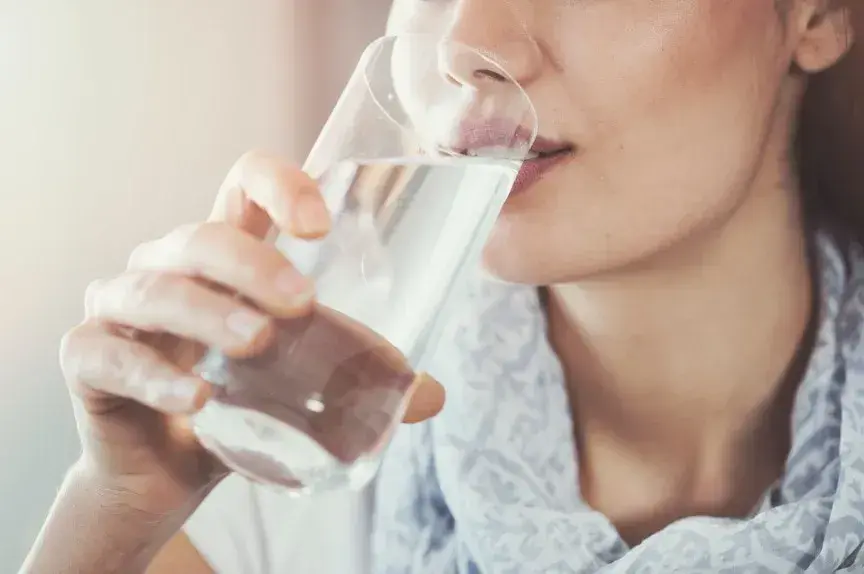
/assets/images/provider/photos/2579840.jpg)
Drinking enough water is one of the most important things you can do for your overall health. In fact, at Garcia Weight Loss, hydration is one of the cornerstones of our health plans, along with nutrition, regular physical activity, and supplementation. We simply cannot stress how important it is to keep yourself hydrated, or list the countless health problems related to chronic dehydration.
The human body is made up of about 65% water. Water is necessary for proper functioning of numerous bodily processes including blood circulation, metabolism, regulation of body temperature, and removal of waste.
People are often surprised to learn that not drinking enough water can impede your ability to lose weight. In fact, when people hit a weight-loss plateau, drinking more water often helps them push past it.
Is drinking more water the secret to losing weight? Exactly how much water should you be drinking on a daily basis to stay healthy? Here’s what you need to know about water and your health.
Health problems associated with dehydration
Dehydration is much more common than many people realize. Up to 75% of Americans aren’t drinking enough water and as a result are suffering from symptoms including fatigue, headaches, muscle cramps, dizziness, constipation, irritability, difficulty concentrating, and joint pain.
What causes dehydration? Aside from not drinking enough water, dehydration can be caused by excessive sweating, fever, increased urination, diarrhea, and vomiting. You may be at greater risk for dehydration if you work or exercise outdoors, are an older adult, or suffer from a chronic illness such as kidney disease or uncontrolled diabetes.
When you fail to keep yourself hydrated and suffer from chronic dehydration, you face the risk for serious health and medical conditions including heat injury, cholesterol imbalances, frequent respiratory problems, premature aging, kidney failure, seizures, and low blood volume shock. You can reduce your risk of dehydration by drinking plenty of water and eating lots of fruits and vegetables with high water content.
How much water do I need to drink?
You’ve probably heard the rule that you should drink eight 8-ounce glasses of water every day. But is this guideline right for everyone? How much water you need depends on your weight, size, and activity level.
The Food and Nutrition Board recommends 91 ounces of water for women and 125 ounces of water for men through a combination of beverages and foods with a high water content. Some experts recommend drinking at least half an ounce of water for each pound that you weigh. For instance, if you weigh 150 pounds, you need at least 75 ounces of water. If you’re active, you may need even more water, especially if you’re exercising in hot weather.
To make sure you’re drinking enough water, check your urine when you go to the bathroom. It sound be clear and have little to no odor. If your urine is dark or yellow, you need to start drinking more water. (Keep in mind, however, that some supplements can turn urine bright yellow.)
How much water should I drink to lose weight?
There is no specific amount of water that can make you lose weight. However, replacing high-calorie drinks with water is a great first step toward using water to accelerate your weight-loss progress. Stop drinking sodas, fruit juices, and flavored coffees, and drink water instead. These sugary drinks can spike your blood sugar level and contribute to food cravings later in the day following your sugar high.
Additionally, drink cold water instead of warm water to facilitate the burning of more calories. When you drink cold water, your body will use more energy to make the water the same temperature as your body so it can be properly absorbed. This results in burning more calories.
Does too much water make you gain weight?
One quart of water weighs two pounds. If you drink a high amount of water within a short time, you may notice the difference on the scale right away. But this type of weight is known as water weight, and isn’t the same as fat. Your body may retain water weight for longer than 24 hours if you consume high amounts of sodium, or if you’re suffering from a health condition such as cirrhosis or kidney disease that causes water retention.
Drinking water helps you lose weight more than it contributes to water weight gain. Water helps you stay full and can ward off cravings and hunger pangs. Water also flushes waste and toxins from your body, which help you stay slim and healthy.
Can too much water make you sick?
There is such a thing as drinking too much water to the point it makes you sick, but this is extremely rare and difficult to do. Drinking too much water can lead to a serious condition called hyponatremia, which happens when your body holds on to so much water that the amount of sodium in your blood becomes diluted. This can lead to symptoms including nausea, fatigue, dizziness, confusion, and headache. Acute hyponatremia can lead to more serious complications including brain disease, brain swelling, seizure, coma, and death.
Can other beverages count towards my water intake?
Drinks that are high in caffeine will act as diuretics, which may contribute to further dehydration. These drinks also tend to be high in sugar and other additives that can be dangerous to your health.
Pure water is the best choice to keep your body functioning optimally, but you can also try flavored water or sparkling water. If you’re experiencing difficulty with cutting back on soda, energy drinks, fruit juices, and other sugary beverages, start swapping out at least one drink per day with a glass of water. If you’re turned off by the taste of plain water, try flavoring it with cucumber or citrus fruits like lemon or lime. You can also try green tea, which is high in beneficial antioxidants and contains less caffeine than coffee.
How do I know if I’m drinking enough water?
The best way to know if you’re drinking enough water is to check the color of your urine. Your urine should always be clear or pale yellow, with the exception of your first trip to the bathroom after you wake up, which may be a slightly darker yellow. Dark yellow urine means you may not be properly hydrated. However, if you’re taking a nutritional supplement that contains vitamin B2, your urine may be bright yellow in color due to the way your body excretes extra amounts of this vitamin through urine.
You’ll also know you’re drinking enough water if your digestion and bowel movements feel comfortable and regular. Constipation and hard bowel movements are common signs you may not be drinking enough water. When you’re drinking enough water, you may also notice that you have more energy, your skin is brighter, and your memory is better. Headaches, dry mouth, dizziness, sluggishness, and fatigue are also signs that you may not be drinking enough water.
5 important reasons to drink more water for weight loss
Water keeps many systems throughout the body running smoothly — including digestion and metabolism, which both play a key role in weight management. Here are 5 reasons drinking more water may help with your weight-loss goals:
- Staying hydrated may help you eat less. Thirst can masquerade as hunger. When you’re tempted to eat, you may actually just need a glass of water. Other symptoms that we often associate with hunger — such as a gurgling stomach or lightheadedness — may also indicate thirst. When you feel hunger kicking in, try drinking a glass of water before you eat. In a 2015 study, adults who drank 16 ounces of water 30 minutes before eating consumed fewer calories and lost more weight than the control group.
- Water boosts your metabolism. Drinking water helps you burn more calories. That’s because whenever you eat or drink, your body burns energy to process whatever is coming in. Also, since water is calorie-free, you may end up burning more than you consume. Evidence suggests that healthy men and women who drink about 16 ounces of water may experience a 30% increase in their metabolic rate within 10 minutes.
- Water fuels your workouts. When you’re dehydrated, your workouts will suffer — and so will your results. Losing just 2% of your body weight in fluid can impede your performance by up to 25%. If you’re already dehydrated when you start working out, you may become even more dehydrated as you sweat. To get the most out of your workouts, drink water before, during, and after your exercise routine. Make sure you’re well hydrated to begin with, and drink 15 to 20 ounces of water an hour before your workout, and another 8 ounces every 30 minutes during exercise. You may need more water if you’re sweating heavily.
- Water prevents you from drinking other unhealthy beverages. If you’re drinking more water, you’re probably drinking fewer unhealthy beverages like soda or calorie-laden coffee drinks. People who drink plain water have been shown to consume fewer calories from other beverages. We love a mocha latte as much as the next person — but save these sweet treats for a special occasion!
- Water gives you more energy. Feeling dehydrated and sluggish can make it difficult for you to find the motivation to get off the couch. Water lubricates your organs and keeps your cells working properly, your muscles oxygenated, and your brain functioning at its best — all of which help you stay motivated and focused on your goals. The next time you feel an energy slump, grab a glass of water instead of pouring yourself a cup of coffee or heading to the vending machine.
Tips for drinking more water
- Use an app like Fitbit to track your beverage intake or download a separate app like Waterlogged and set it to give you reminders to drink throughout the day.
- Spruce up your water with lemon, cucumber, or berries. The added flavor could motivate you to drink more and even delivers some added benefits. Lemon water has been shown to boost the immune system and aid in digestion.
- Invest in a nice water bottle that keeps your water cool, and take it with you everywhere you go.
- Install a water filtration or purification system in your home. This makes it easier and more convenient for you to drink water throughout the day instead of having to make special trips to the grocery store to buy bottled water.
- Eat more foods that are naturally high in water content. The foods you eat can help you meet your daily recommended intake of water. Watermelon, celery, cucumbers, lettuce, and citrus fruits are just some foods you can eat that are loaded with water.
- Experiment with non-caffeinated herbal teas. Peppermint, rooibos, chamomile, and ginger are just a few of the countless herbal teas that can help you stay hydrated while offering additional health benefits.
Need help with your weight-loss goals? Garcia Weight Loss offers personalized weight-loss programs designed to help you unlock your full weight-loss potential. Contact us today for your no-cost consultation!



